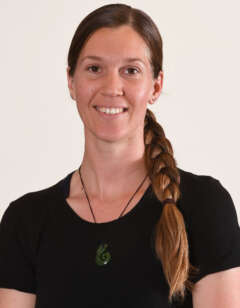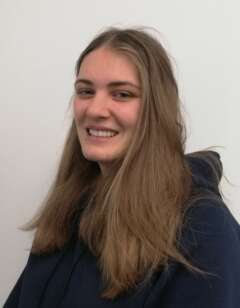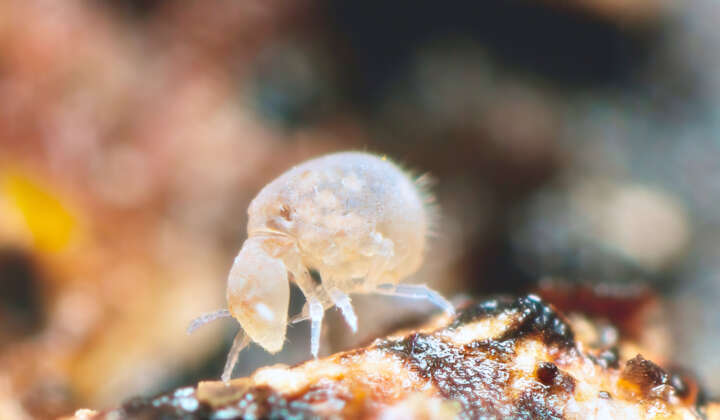
Research interests
Metabarcoding complex communities
Lake sediment-preserved DNA in paleoecology
Impact of climate change on biodiversity
Distribution and differentiation of organisms





Anna Merges is currently working on the project ‘BE-Spring as her PhD project: Discovering Collembola biodiversity on grasslands with emerging genomic and metagenomic tools’ within the Biodiversity Exploratories, funded by DFG. In this project she aims to establish a springtail (Collembola) genome reference database (SGRD) for the most abundant soil springtail species on the 150 Exploratories grassland plots distributed across Northern-, Central- and Southern Germany (in the Biosphere Reserve Schorfheide-Chorin, the National Park Hainich and the Biosphere Reserve Schwäbische Alb, respectively). Using a shotgun metagenomic approach established within ‘MetaInvert’ her goal is to then describe these springtail communities and investigate (1) how environmental drivers and the intensification of grassland-use influence springtail community composition and functioning and (2) how springtails relate to other biological components of the grassland ecosystems. Alongside Miki Bálint, also Clément Schneider (head of the Apterygota section, SGN Görlitz) and Pete Manning (head of the working group ‘Causes and Consequences of biodiversity change’, S-BikF) are involved as project PI’s, as well as Dennis Baulechner and Volkmar Wolters (Justus Liebig University, Gießen & RESOILIENCE project, Biodiversity Exploratories) as collaborative partners.

Als Teil des PHYTOARK unter Leitung des Leibniz-Instituts für Ostseeforschung Warnemünde (IOW) werde ich die historischen Artgemeinschaftsveränderungen von Phytoplankton in der Ostsee analysieren.


Lena Bonassin is working on the GEODE project as Ph.D. candidate. As part of her research, she is studying the evolution of genome organization in European crayfish species focusing on the comparative study of crayfish genomes. The project aims to identify and compare the content and landscape of repetitive elements present in the genome of European freshwater crayfish species. I will study the karyotype characteristics in crayfish through a combination of cytogenetic techniques and a bioinformatic approach. By comparing karyotype characteristics between closely related species, insight into evolutionary processes and chromosomal rearrangements will be gained. The research will help in the establishment of the first chromosome-level reference genome of the Astacidae family.
Former group members

2021
Schneider, C., Woehle, C., Greve, C., D’Haese, C. A., Wolf, M., Hiller, M., Janke, A., Bálint, M., Huettel, B. (2021): Two high-quality de novo genomes from single ethanol-preserved specimens of tiny metazoans (Collembola). GigaScience (in press).
2018
Schneider, C., Zhon, S,. & D’Haese, C.A. (2018): Account of a neglected springtail widely distributed in the intertropical one (Neelipleona, Neelidae). International Journal of Tropical Insect Science 1-24.
2017
Schneider, C. & Deharveng, L. (2017): First record of the genus Spinaethorax Papáč & Palacios-Vargas (Collembola, Neelipleona, Neelidae) in Asia, with a new species from a Vietnamese cave. European Journal of Taxonomy 363.
Schneider, C. (2017): Morphological review of the order Neelipleona (Collembola) through the redescription of the type species of Acanthoneelidus, Neelides and Neelus. Zootaxa 4308, 1–94.
2016
Schneider, C. & Deharveng, L. (2016): Two new Megalothorax species of the minimus group (Collembola, Neelidae). ZooKeys, 554, 37–68.
2014
Shrubovych, J., Schneider, C. & D’Haese, C.A. (2014): Revision of the Genus Andinentulus (Protura: Acerentomidae: Berberentulinae), With a Key to South American Acerentomidae Species. Entomological Society of America, 107, 567–574.
Shrubovych, J., Schneider, C. & D’Haese, C.A. (2014): Two new species of Acerentulus Berlese, 1908 (Protura: Acerentomata: Acerentomidae) with their barcode sequences and a key to the cunhai group. Annales de la Société Entomologique de France, 50, 129–140.
2013
Schneider, C. & D’Haese, C.A. (2013): Morphological and molecular insights on Megalothorax. The largest Neelipleona genus revisited (Collembola). Invertebrates Systematics, 27, 317–364.
2012
Shrubovych, J., Schneider, C. & D’Haese, C.A. (2012): Description of a new species of Acerentulus Berlese, 1908 (Protura: Acerentomata: Acerentomidae) with its barcode sequence and a key to the confinis group. Annales de la Société Entomologique de France (N.S.) 48, 1–7.
2011
Schneider, C., Cruaud, C. & D’Haese, C.A. (2011): Unexpected diversity in Neelipleona revealed by molecular phylogeny approach (Hexapoda, Collembola). Soil Organisms, 83, 383–398.

Dr. Gemma Collins is a postdoctoral fellow working on the ‘MetaInvert’ project to compare genomes from over 250 individual soil invertebrates. This includes functional analyses of the genomes as well as evaluating any factors that may influence the success of genome sequencing. One of the overarching aims of MetaInvert is to generate a representative resource of soil invertebrate species in Germany for use as a reference library for metagenomic sequencing and Dr. Gemma Collins will also be contributing towards that goal.

As part of my Ph.D., my research focuses on the host-pathogen relationship between Aphanomyces astaci (the crayfish plague disease agent) and crayfish species. In the past 3 years, I conducted infection experiments aimed to infer A. astaci’s virulence and crayfish’s resistance/susceptibility. This allowed inferring how the co-evolution between host and pathogen shaped and is still shaping the outcomes of the interactions between crayfish species and A. astaci, macroscopically (death or survival of the crayfish) and from a molecular point of view (immune response). In the following months, I will focus on the virulence variability of A. astaci strains by I determining the virulence of different strains through infection experiments (already carried out), determination of the speed of growth and of the number of spores produced. Once the virulence is determined based on these parameters, I will investigate the possible correlation between loci and virulence, to infer if the variance in the virulence is encoded in the genome.”


Ph.D. candidate at the University of Konstanz. Her Ph.D. thesis takes place in cooperation with this research group within the PhytoArk project.
Alexandra Schmidt is working on the project ‘Metagenomics of soil invertebrate mock communities’ as M.Sc. candidate. Her aim is to evaluate the identification accuracy and read-biomass relationships in mock metagenomic soil invertebrate samples. Genome information of the ‘MetaInvert’ project is used as a reference database. The mock ups cover a wide range of taxonomic groups and compositions (biomass distribution). With this research we hope to make future metagenomic field monitoring projects more efficient.



